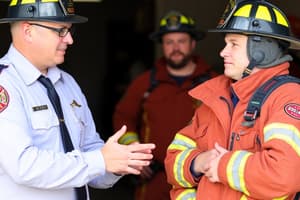Podcast
Questions and Answers
Which leadership style is MOST appropriate for a fire officer to employ during a rapidly escalating fire incident where immediate action is critical?
Which leadership style is MOST appropriate for a fire officer to employ during a rapidly escalating fire incident where immediate action is critical?
- Laissez-faire
- Autocratic (correct)
- Transformational
- Democratic
A fire officer notices a conflict arising between two firefighters regarding differing approaches to a task. What INITIAL action should the officer take to effectively manage the conflict?
A fire officer notices a conflict arising between two firefighters regarding differing approaches to a task. What INITIAL action should the officer take to effectively manage the conflict?
- Mediate a discussion between the firefighters to understand their perspectives. (correct)
- Publicly reprimand both firefighters to discourage future disputes.
- Immediately assign them to different tasks to avoid further conflict.
- Document the conflict and wait for it to escalate before intervening.
A fire officer is tasked with improving the overall physical fitness of their crew. Which strategy would BEST contribute to achieving this goal?
A fire officer is tasked with improving the overall physical fitness of their crew. Which strategy would BEST contribute to achieving this goal?
- Focusing solely on correcting the fitness deficiencies of the least fit members.
- Implementing a voluntary fitness program with incentives and educational resources. (correct)
- Mandating a strict diet for all firefighters.
- Excluding firefighters who fail to meet fitness standards from responding to calls.
A fire department aims to improve its community relations. Which initiative would MOST effectively achieve this goal?
A fire department aims to improve its community relations. Which initiative would MOST effectively achieve this goal?
During a post-incident analysis, a fire officer identifies a miscommunication issue that led to a delay in water supply. Which action would BEST prevent this issue from recurring?
During a post-incident analysis, a fire officer identifies a miscommunication issue that led to a delay in water supply. Which action would BEST prevent this issue from recurring?
A newly appointed fire officer is struggling to gain the respect of their crew, who are mostly senior firefighters. What strategy would be MOST effective for the officer to build credibility and trust?
A newly appointed fire officer is struggling to gain the respect of their crew, who are mostly senior firefighters. What strategy would be MOST effective for the officer to build credibility and trust?
A fire officer is preparing to conduct performance evaluations for their crew. Which approach would BEST ensure a fair and constructive evaluation process?
A fire officer is preparing to conduct performance evaluations for their crew. Which approach would BEST ensure a fair and constructive evaluation process?
A fire department wants to improve its data collection and analysis capabilities. What technological advancement would MOST directly contribute to this goal?
A fire department wants to improve its data collection and analysis capabilities. What technological advancement would MOST directly contribute to this goal?
Which action by a fire officer BEST demonstrates a commitment to ethical conduct?
Which action by a fire officer BEST demonstrates a commitment to ethical conduct?
A fire officer is developing a succession plan for their department. What is the PRIMARY goal of this plan?
A fire officer is developing a succession plan for their department. What is the PRIMARY goal of this plan?
Flashcards
Leadership
Leadership
Guiding, motivating, and inspiring a team to achieve common goals and objectives.
Communication
Communication
Using clear verbal and written skills to convey information, give orders, and interact effectively.
Decision-Making
Decision-Making
Applying sound judgment to make quick and effective choices under pressure.
Autocratic Leadership
Autocratic Leadership
Signup and view all the flashcards
Democratic Leadership
Democratic Leadership
Signup and view all the flashcards
Laissez-faire Leadership
Laissez-faire Leadership
Signup and view all the flashcards
Incident Command System (ICS)
Incident Command System (ICS)
Signup and view all the flashcards
Performance Evaluations
Performance Evaluations
Signup and view all the flashcards
Public Education
Public Education
Signup and view all the flashcards
Integrity
Integrity
Signup and view all the flashcards
Study Notes
- Transitioning from firefighter to fire officer involves a significant shift in responsibilities, requiring a blend of experience, leadership skills, and a commitment to professional development.
Understanding the Fire Officer Role
- Fire officers are responsible for the safety and effectiveness of their crew, managing incidents, and ensuring adherence to departmental policies and procedures.
- They act as supervisors, mentors, and decision-makers, bridging the gap between firefighters and senior management.
- Key responsibilities include incident command, personnel management, training, resource allocation, and community relations.
Required Skills and Competencies
- Leadership: Ability to guide, motivate, and inspire a team.
- Communication: Clear and effective verbal and written communication skills are essential for giving orders, writing reports, and interacting with the public.
- Decision-Making: Sound judgment and the ability to make quick, effective decisions under pressure.
- Problem-Solving: Identifying and resolving issues that arise during incidents or in the station.
- Technical Competence: Maintaining proficiency in firefighting techniques and understanding of fire science.
- Administrative Skills: Managing budgets, maintaining records, and ensuring compliance with regulations.
Challenges in Transition
- Shift in Perspective: Moving from a task-oriented role to a leadership role requires a change in mindset.
- Earning Respect: New officers must earn the respect of their crew through competence, fairness, and integrity.
- Balancing Friendship and Authority: Maintaining professional boundaries while still being approachable.
- Responsibility and Accountability: Officers are responsible for the actions and safety of their crew.
- Conflict Resolution: Addressing and resolving conflicts within the team.
Preparation and Training
- Formal Education: Many departments require or prefer officers to have a degree in fire science or a related field.
- Officer Training Programs: Comprehensive programs that cover leadership, incident management, and administrative duties.
- Mentorship: Guidance from experienced officers can provide valuable insights and support.
- Continuous Learning: Staying updated on new techniques, technologies, and best practices through ongoing training and education.
- Scenario-Based Training: Participating in simulations and drills to practice decision-making and leadership skills in realistic situations.
Leadership Styles
- Autocratic: Making decisions independently and expecting obedience (useful in high-pressure situations).
- Democratic: Involving the team in decision-making (promotes buy-in and teamwork).
- Laissez-faire: Delegating authority and allowing the team to self-manage (effective with experienced, self-motivated teams).
- Transformational: Inspiring and motivating the team to achieve common goals (fosters a positive and innovative environment).
- Situational: Adapting leadership style to the specific situation and needs of the team.
Incident Command System (ICS)
- Understanding and applying the ICS is crucial for managing incidents effectively.
- The ICS provides a standardized framework for command, control, and coordination of resources.
- Key roles within the ICS include Incident Commander, Operations Section Chief, Planning Section Chief, Logistics Section Chief, and Finance/Administration Section Chief.
- Officers must be proficient in establishing command, delegating responsibilities, and maintaining situational awareness.
Personnel Management
- Performance Evaluations: Conducting regular performance reviews to provide feedback and identify areas for improvement.
- Discipline: Addressing misconduct and enforcing departmental policies fairly and consistently.
- Conflict Resolution: Mediating disputes and finding mutually agreeable solutions.
- Mentoring: Providing guidance and support to help firefighters develop their skills and advance their careers.
- Team Building: Fostering a positive and cohesive team environment through activities and shared goals.
Community Relations
- Public Education: Conducting fire safety presentations and community outreach programs.
- Community Engagement: Participating in local events and building relationships with residents.
- Media Relations: Communicating with the media during incidents and promoting the department's activities.
- Customer Service: Providing courteous and professional service to the public.
Ethical Considerations
- Integrity: Maintaining honesty and ethical behavior in all actions.
- Fairness: Treating all firefighters and members of the public equitably.
- Accountability: Taking responsibility for one's actions and decisions.
- Confidentiality: Protecting sensitive information.
- Professionalism: Maintaining a high standard of conduct both on and off duty.
Legal and Regulatory Compliance
- Understanding and adhering to local, state, and federal laws and regulations.
- Ensuring compliance with departmental policies and procedures.
- Maintaining accurate records and documentation.
- Staying informed about changes in legislation and regulations.
Health and Safety
- Prioritizing the health and safety of firefighters and the public.
- Implementing and enforcing safety protocols.
- Conducting regular safety inspections and drills.
- Promoting a culture of safety within the department.
- Ensuring that firefighters have the necessary equipment and training to perform their duties safely.
Stress Management and Resilience
- Fire officers must be able to manage stress effectively, both for themselves and their crew.
- Developing coping mechanisms for dealing with traumatic incidents.
- Promoting mental and emotional well-being among firefighters.
- Seeking support from mental health professionals when needed.
- Building resilience through physical fitness, healthy lifestyle choices, and strong social support networks.
Technology and Innovation
- Staying updated on new technologies and innovations in the fire service.
- Utilizing technology to improve efficiency and effectiveness.
- Implementing new tools and techniques for firefighting, rescue, and incident management.
- Embracing data analytics for decision-making and resource allocation.
- Using social media and other platforms to communicate with the public and promote fire safety.
Continuous Improvement
- Seeking feedback from firefighters, peers, and supervisors.
- Identifying areas for improvement in leadership and management skills.
- Participating in professional development opportunities.
- Learning from mistakes and adapting to new challenges.
- Fostering a culture of continuous learning and improvement within the department.
Succession Planning
- Identifying and developing future leaders within the department.
- Providing mentorship and training opportunities for aspiring officers.
- Ensuring a smooth transition of leadership when officers retire or move on.
- Creating a pipeline of qualified candidates for future officer positions.
- Planning for the long-term sustainability and success of the department.
Political and Community Awareness
- Understanding the political landscape and its impact on the fire service.
- Building relationships with elected officials and community leaders.
- Advocating for the needs of the department and the community.
- Engaging in community outreach and education efforts.
- Responding to the needs and concerns of the community.
Financial Management
- Understanding budget processes and financial management principles.
- Making responsible decisions regarding resource allocation.
- Seeking opportunities to secure grants and other funding sources.
- Managing departmental assets and equipment effectively.
- Ensuring transparency and accountability in financial matters.
Studying That Suits You
Use AI to generate personalized quizzes and flashcards to suit your learning preferences.




